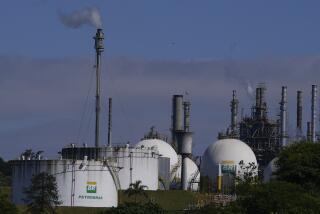ExxonMobil Plans Early MTBE Halt
- Share via
ExxonMobil Corp. will phase out a potential cancer-causing chemical from its California gasoline one year ahead of a state deadline, the company said Wednesday. The world’s largest petroleum company joins three major oil firms that have committed to removing MTBE from their gas.
“In keeping with our commitment to providing California consumers with gasoline that meets the state’s environmental standards, we will phase out MTBE and convert to ethanol by early 2003,” said Prem Nair, a spokeswoman in the company’s Fairfax, Va., office.
MTBE, or methyl tertiary-butyl ether, is added to gasoline to make it burn cleaner, reducing air pollution. Using MTBE was common in the 1990s, but research showed it is a probable carcinogen, spreading quickly through groundwater.
In 1999, Gov. Gray Davis announced a phaseout of the chemical by the end of 2002. But earlier this year, he delayed the ban a year because of concerns about gasoline shortages and price increases.
Still, BP Amoco, Shell Oil Co. and Philips Petroleum Co. committed to removing MTBE from California gasoline by the end of the year, which would mean that 60% of the state’s gasoline would be MTBE-free by early 2003. Gasoline refiners must add an oxygenate because of the federal Clean Air Act, and will replace MTBE with ethanol, which is made from corn.
Environmentalists praised the move.
“ExxonMobil has clearly decided that MTBE is no longer worth the liability and public-relations risk,” said Brooke Coleman, director of the Renewable Energy Action Project, a San Francisco-based environmental group that has been pressuring oil companies to phase out MTBE earlier than the new deadline. “Californians will now have the ability to choose MTBE-free fuel in 2003. That’s good news for our drinking-water supplies.”
Coleman, who was disturbed by Davis’ delay of the ban, said the oil companies’ actions prove the governor was more concerned about reelection than about pollution and potential health hazards. “Gov. Davis was worried about politics first and, in this case, drinking water second,” Coleman said.
A Davis administration spokesman said that’s not the case, and the phaseout delay was driven by the governor’s concerns about smaller oil producers, who are going to have a harder time setting up the infrastructure to import ethanol from the Midwest and distribute it throughout California.
“It’s going to be the smaller refiners ... which are going to be most problematic in terms of making the switch-over,” said William L. Rukeyser, assistant secretary of the California Environmental Protection Agency.
“You have very different market dynamics if you have companies making their own decision versus the entire industry having to make the switch-over,” he said.
Coleman said ExxonMobil’s announcement leaves San Francisco-based ChevronTexaco Corp., the nation’s second-largest oil company, as the only major producer that hasn’t committed to an early phaseout of the additive. Spokeswoman Nicole Hodgson said the company is still working on infrastructure, permitting and transportation issues.
More to Read
Inside the business of entertainment
The Wide Shot brings you news, analysis and insights on everything from streaming wars to production — and what it all means for the future.
You may occasionally receive promotional content from the Los Angeles Times.











